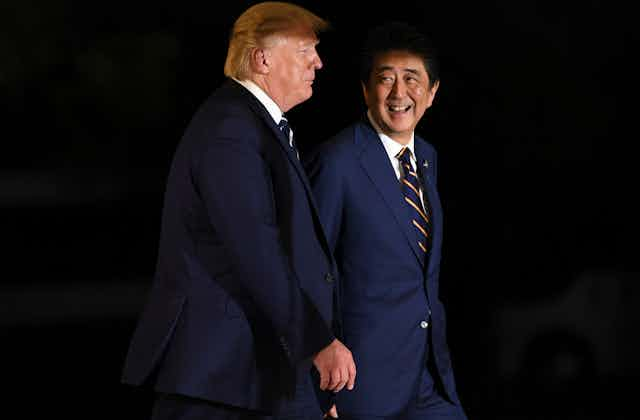When the US agreed a partial trade deal with Japan in late September, Donald Trump called it a “very big trade deal”, a “tremendous trade deal” even. The initial agreement boosts the US president both in terms of his ongoing trade war with China and his bid for re-election.
The US has effectively secured preferential access to the Japanese market for US agricultural exports, providing an outlet for goods that have been hit by China’s retaliatory tariffs, and a reason for many US farmers to vote for Trump in 2020.
Japan has a temporary reprieve on automobile tariffs, but not much else to show. But this is part of a familiar pattern: Japanese prime minister Shinzo Abe has bent over backwards to accommodate Trump since his surprise presidential win in 2016, and he’s not the only world leader to do so.
In fact, analysis of how world leaders have responded to Trump since his election pours doubt over the argument that the US is in serious decline. There are a few versions of the story of diminishing US power, such as the one where a rising China inevitably challenges the US, or the one where the global US-led liberal order collapses. In all these narratives, Trump’s election is usually seen as both a symptom and a cause of the decline and fall of the US empire.
But does Trump’s election really represent a US raging against the dying of the light? His foreign policy, and the international response to it, indicates that for the moment the US remains by far the most powerful state in the world – and Trump himself is well aware of this.
He has thrown out the playbook in terms of how to deal with US allies. While he cosies up to dictators, he uses threats and blackmail to cajole friends into giving the US “a better deal”. Meanwhile, these allies work hard to accommodate him – none more so than Japan.
Abe’s dilemma
The US-Japan alliance has been described as the “cornerstone” of regional security. Japan gets American protection, which enables Tokyo to focus on the economy, while the US gets strategic bases across the Japanese archipelago, enabling it to project its force across East Asia and beyond.
But, during his 2016 campaign, Trump accused Japan of free-riding and pledged to renegotiate this arrangement. He threatened to reduce US military forces in the region while demanding that Japan and South Korea step up their efforts to manage their own national security, even though both states make the list of the world’s top ten military spenders. He even suggested they develop nuclear weapons.
In Japan, Trump triggered a long-held fear of abandonment. As if to confirm this, one of his first foreign policy acts as president was to withdraw from the Trans-Pacific Partnership (TPP), a regional free trade agreement including Japan, aimed at shoring up US relationships in the region and countering China’s growing influence.
Since then, Japan has also suffered collateral damage from the US-China trade war, which has caused the yen to appreciate, dampening Japanese exports and the country’s economic outlook. Trump pushed hard for a bilateral free-trade agreement with Japan to temper the fallout of the trade war for the American economy. Preferring to rescue the multilateral TPP framework, Japan was reluctant.
However, in March 2018, Trump increased pressure, introducing tariffs and quotas on steel and aluminium targeting key US trade partners including Japan and Germany. While some waivers for steel were granted to Japan, not all Japanese steelmakers could access them.
Read more: Winners and losers in the US-China trade war
But with Japan’s automobile industry particularly threatened by potential US tariffs of up to 25% on cars and car parts, Abe finally conceded to a deal, granting the US preferential access to its agricultural market in order to stabilise international trade and reduce US pressure.

Japan, a long-time ally, has gone out of its way, not only to avoid criticising Trump, but actually to help him. Abe has bestowed honour after honour on him, from inventing a special Sumo “President’s Cup” for Trump to writing a letter recommending him for the Nobel Peace Prize. It’s not as though Trump has been equally kind to Abe – quite the opposite. He has publicly mocked Abe and ignored Japan’s repeated calls for a tougher line on North Korea.
Appeasing Trump
Abe is perhaps at the extreme end of Trump appeasers, but his actions are hardly unique. The world’s most politically and economically powerful leaders are careful not to criticise Trump too openly, and to go along with his plans.
Read more: In Ukraine, Donald Trump impeachment controversy is an unwanted distraction for Volodymyr Zelenskiy
When Trump tried to implement a ban on Muslim immigration to the US, the leaders of both Saudi Arabia and Egypt kept quiet, as did the Organisation of Islamic Co-operation. In Europe, some leaders have rebuked Trump over some of his worst excesses. German chancellor Angela Merkel, who has publicly challenged Trump on a number of issues, mostly recently after he told four US congresswoman to “go back and help fix the totally broken and crime-infested places from which they came”.
But for the most part, Europe’s leaders have either said nothing against Trump’s behaviour, or been very careful with their words. British prime minister Boris Johnson actively courts Trump in the hope of softening the Brexit blow to the British economy with a future US-UK trade deal. All these leaders know that the US remains by far the most powerful state in the world, economically, militarily and technologically. Trump is its leader and he knows its power.
In the future, power may shift sufficiently for the world to react differently to a demagogue like Trump in the White House. But for now, regardless of the depths Trump plumbs, it seems that most states have made the geopolitical calculations and decided to stay quiet.

